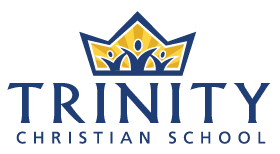- Our Mission -
Trinity exists to awaken curiosity, nurture faith, and inspire learners to reflect Jesus everywhere.
- Our Vision -
Seeking to be a place of welcome and care, Trinity will create lasting value for families by focusing on Christ-centered leadership and faith-infused pedagogy.
Trinity Christian School Curricula and Learning Framework
Trinity Christian School offers a distinctively Christian curriculum including a full day Junior/Senior Kindergarten through Grade 8 program. The academic standards and expectations are derived from the Ontario Ministry of Education curriculum, through which a Christian perspective and Biblical worldview are infused in both the content and context of teaching and learning. The curriculum consists of Language Arts, French, Biblical studies, Science, Social Studies (History and Geography in Gr. 7 and 8), Mathematics, Physical Education, Health, Music and Visual Arts.
The Biblical Framework of the program is supported by our three core strands derived from our mission statement: to awaken curiosity, nurture faith and inspire learning.
We encourage our students to be responsive disciples, image bearers of Jesus Christ, and faithful stewards of the world - while developing the fruit of the Spirit and joyfully pursuing a love of learning. As students move through their journey as learners, we invite them to engage God’s Story, exploring these areas and essential questions woven through their subject areas.
God’s Story in ME: I am God's beautiful creation - an image-bearer of our Triune God.
What does it mean to be an image bearer of Christ? Who am I as a learner? What can I contribute to my classroom community?
God’s Story in US: I am part of God's covenant family through Jesus.
What does it mean to be in the body of Christ? Who are we in this Grand Narrative?
Living God’s Story: I am invited to the calling of bringing the SHALOM that Jesus made possible.
What does our learning tell us about who God is and how we are to live for His glory?
Our Learning Framework is influenced by our responsive pedagogy through Differentiated Instruction (DI) and Response to Intervention (RTI) as we respond to and strive to meet the learning needs of all our students. We intentionally focus on three dimensions of student achievement; mastery of knowledge and skills (with a strong emphasis in literacy and numeracy), culture and character development and high quality student work.
- Mastery of Knowledge and Skills: Carefully planned curricula outline the scope and sequence of understanding, proficiency and application of skills students will be expected to achieve at each grade level and within each discipline. This includes but is not limited to solving problems, thinking critically, applying learning to meaningful disciplinary tasks, and communicating clearly about complex ideas. High-level student thinking and work occur daily and is a normal expectation for all students.
- Culture and Character: Creating and fostering character through a learning culture is essential for successful learning. We believe “that a Spirit-filled community will reveal the fruit as outlined in Galatians 5:22-23 -- love, joy, peace, patience, kindness, goodness, faithfulness, gentleness and self control.”This dimension of student achievement relates to non-cognitive skills that support student success. Performance character includes the academic mindsets and habits of scholarship that students bring to learning. Relational character includes the way students treat and work with others. Both aspects of character are essential and interconnected.
Learning Skills include:
Responsibility, Organization, Independent Work, Initiative, Self-Regulation, Collaboration.
Character Traits include:
Awakening Curiosity through…
Wonder: awe-filled exploration of God’s World
Delight: joy in discoveryNurturing Faith through…
Gratitude: thankful recognition of God’s love and forgiveness through Jesus
Integrity: growing in ways to help others see Jesus in meInspiring Learners to Reflect Jesus Everywhere through…
Courage: stepping out of my comfort zone in my learning and relationships
Compassion: empathy and care for self and others as Jesus’ hands and feet - High Quality Student Work
This dimension of student achievement asks students to transfer disciplinary knowledge and skills to authentic contexts. Students put knowledge and skills to use in order to solve complex problems and create a body of work that shows craftsmanship, depth of thinking and creative application. Students present their work to diverse audiences and communicate their thinking clearly.
Subject Areas
Assessment & Evaluation
Assessment and Evaluation
Assessment and evaluation are an integral part of the learning process at every grade level and therefore must be planned in conjunction with curriculum expectations. The purpose of assessment and evaluation is to improve student learning. There is a direct link between curriculum expectations, instruction, assessment, and evaluation.
We recognize that within this framework; ongoing assessment and reflection provide opportunities for changes to curriculum, learning spaces and the use of technology. Our desire is to provide a community where students can learn and grow confidently within a safe and caring environment.

